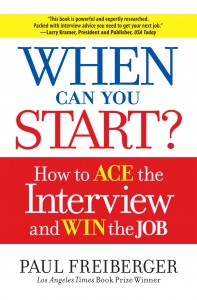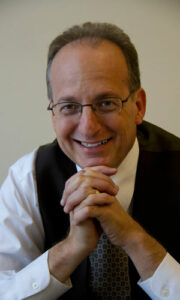Paul Freiberger knows the job search process from all angles. He worked as a cook, a janitor, a night porter, and a garment worker. He’s been a language teacher, a newspaper reporter and an author. He’s an inventor and a corporate communications professional. With that background Paul decided to focus on career coaching, outplacement, and resume writing.
He’s just written a new book about interviewing, and it’s a practical guide to the job interviewing process. It’s especially helpful for both new graduates starting in a challenging job market and for almost anyone in the midst of looking for a job.
I recently had the chance to ask Paul a few questions about his new book, When Can You Start? How to Ace the Interview and Win the Job.
Tips for the Interview
Paul, I’ve written (okay, maybe it was a bit of a rant) about resumes before. You are an expert on resumes, but also on the interview.
 Everyone knows an interview is about qualifications. But, it’s more than that. One of the questions on an interviewer’s mind is never asked, but it’s always lurking in the background. You call it out: “Will we enjoy working with you?” How do you help make yourself likeable?
Everyone knows an interview is about qualifications. But, it’s more than that. One of the questions on an interviewer’s mind is never asked, but it’s always lurking in the background. You call it out: “Will we enjoy working with you?” How do you help make yourself likeable?
Call on your First Date 101 skills. Be open. Smile. Don’t do all the talking and show your curiosity with some good questions.
What’s an informational interview?
These are fact-gathering meetings with experienced individuals in a field designed to help you understand an industry. These are learning and networking opportunities.
What’s changed about phone interviews today?
Their frequency. Phone screens have become a commonplace interview and if you don’t know how to handle them, you may get eliminated before you get an in-person interview.
How do you use LinkedIn to improve your chances?
Use it to showcase your resume to people you may never meet. Use it to identify people you know at companies that interest you. Use it to find job listings. Use it to join interest groups that help you keep in touch with discussions on important business topics.
Any suggestions when you are being interviewed via the net on a service like Skype?
Dress up as if you were meeting in person. Clean up the mess behind you. Other than that, focus on your answers, as usual.
Many people start an interview with the wide open request, “Tell me about yourself.” As an interviewer, I’m always surprised that this question seems to be a shock to the candidate. You give strategies for dealing with it. One is “talking to your resume.” What does that mean and why is it effective?
Your resume summarizes your career. Learn to discuss each skill on the resume and provide evidence of the skill in the form of an actual accomplishment. If you practice that consistently, you will be half-way to the finish line.
Your book is sprinkled with historical facts. Would you share a bit about how Thomas Edison used and developed the interview?
He came up with a list of 150 questions to pose to job candidates. Some of these were for specific jobs and others were for any job at all, including: Where is the Volga River? What city is the U.S. fur center? What do white corpuscles do? I wonder how many of us could get hired by Edison today.
How do you prepare for a situational or behavioral interview?
Spend time recalling actual events in which you put a key skill to use. Anecdotes help make your skills vivid so be prepared to provide actual examples. Prepare examples that highlight strengths in leadership, organization, communication, and interpersonal skills.
What do you say if you get a trick question?
Stay calm. Don’t panic. Trust your instincts. It’s all about showing that you can handle surprises. Smile. It’s not about having the right answer; it’s about being able to think on your feet.
What if the interviewer starts talking about salary? Should you negotiate on the spot?
Not if you can help it. Save the salary discussion for the moment that you have leverage: when you know the company wants to hire you. Otherwise, try to have them talk to you about how much they expect to pay.
You’ve coached many people throughout the years. Is there a “disaster story” interview you want to share?
One executive recently had a great interview but didn’t get called back. Turns out he had been impolite with the receptionist before the interview. The lesson is obvious: You never know who may influence the hiring decision, so always be on your best behavior.
Do you always need to prepare for an interview?
Yes, yes, yes. An interview is all about preparation. Just like orchestras, football teams, and actors: Rehearsal is critical.
What advice do you have for someone who wants to distinguish herself over other candidates? Is there one tip to stand out?
Prepare more than anyone else.
For more information, see When Can You Start? How to Ace the Interview and Win the Job.

